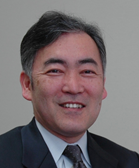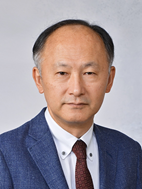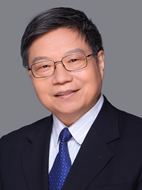ACMSA 2019
Keynote Speakers
1.Prof. Atsuo SUZUKI (Former Vice President of Nanzan University, Vice President of SSJ, Japan)

Dr. Atsuo Suzuki is a professor of the Faculty of Sciences and Engineering in Nanzan University in Japan. He received the Bachelor of Engineering in 1981 from the University of Tokyo, the master degree in 1983 and the doctor degree in 1988 from the same institute. His research interest is in the location sciences and the applications of Operations Research (OR) to the real problems. He has published papers in Operations Research, European Journal of Operational Research, Interfaces, Journal of Operations Research Society of Japan and the other leading journals of Operations Research. He has been doing joint projects with Japanese corporations and organizations in the field of retailing, manufacturing, and healthcare. In 2005, He received the Franz Edelman Finalist Award from INFORMS for “An OR/MS approach to the managing Nanzan Gakuen (Nanzan Educational Complex)”. He received the Best Practice Award in 2008, the Best Case Study Award in 2009 and 2014 both from the Operations Research Society of Japan, and the Best Technology Award from Scheduling Society of Japan in 2015. He is a vice president of the Scheduling Society of Japan.
Title: Analytics Approach to the Improvement of the Management of Hospitals— Aichi Medical University Hospital’s Case
Abstract: In Japan, most of the hospitals are suffering from the management problems. Even in a large university hospital, there is a waste of human resources, labor cost and the other expense. An example of the poor management is that the medical doctors are making their own shift-schedule or the schedule of the operating rooms by themselves without enough support from the scheduling system. As a result, the doctors’ labor load is quite heavy, and the overtime works of the doctors sometimes reaches to a hundred hours per month. Another example is outpatients’ waiting time. It is so serious that sometimes outpatients get angry and leave the hospital before the examination of the doctor. Even if they reserve appointments, they have to wait at least one or two hours. The hospitals are trying to improve the situation by introducing the medical information system, however, the waiting time of the outpatient is still unimproved. These two examples come from the fact that the hospitals do not use Analytics for their management. Cooperating with Aichi Medical University Hospital, we are introducing Analytics to improve the management of the hospital. We have been tackling to the shift-scheduling of the anesthesiologist, the rotation problem of residents, the shift-scheduling of residents, the operating room scheduling, and the estimation of the waiting time of the outpatients. We will introduce several results of the projects in this talk. We show the problems, mathematical formulations, and the systems we developed and utilized in the hospital for each project.
2.Prof. Shinobu YOSHIMURA (Vice President of the University of Tokyo, Vice President of IACM, Japan)

Dr. Shinobu Yoshimura is Vice President and Professor, School of Engineering, The University of Tokyo (UTokyo). In 1987, he completed his studies in School of Engineering, UTokyo (specialized in nuclear engineering) as Doctor of Engineering. He was Lecturer, then Associate Professor of School of Engineering in UTokyo, then Professor in Graduate School of Frontier Sciences, and since 2005, Professor of School of Engineering. Advisor to the President in 2009, later Head of the Public Relations Office, Vice Dean of School of Engineering, Education and Research Councilor, and his present position since 2017. His specialties are High-performance and Intelligent Computational Mechanics with Real World’s Applications. He is a Vice President of IACM (International Association for Computational Mechanics) and a Member of Science Council of Japan. He has received numerous awards, including ICCES Distinguished Achievement Medal (2015), IACM Fellow Award (2014), APACM Computational Mechanics Award (2013), AIAA Liquid Propulsion Best Paper Award (2009), IEEE/ACM Supercomputing 06 Gordon Bell Award finalist (2006).
Title: Intelligent Multi-agent Traffic Simulation with Application to Social System Design
Abstract: There are a variety of serious and modern problems related to city traffics all over the world, i.e. traffic jam and accidents, local as well as global environmental and energy problems, maintenance of mobility in aging societies, and evacuation planning against natural as well as man-made disasters. Especially such problems have been becoming more and more serious in Asian countries. The most critical factor which makes the problems very complex to solve is the interaction among numerous individuals having different preferences and behaviors. These phenomena have been out of scope of quantitative simulation so far. To evaluate, predict and solve such city traffic-related problems precisely as well as quantitatively, we have been developing a Multi-Agent based Traffic and Environmental Simulator named MATES. Here each car driver, pedestrian and others such as tram are modeled as an intelligent agent, and then a city traffic is directly reproduced as a result of the complex interactions among multiple agents having different preferences and behaviors in terms of mobility. In other words, two kinds of complexity in real world’s city traffics are precisely modeled here, i.e. (a) intelligent behavior of each individual and (b) the interaction of numerous individuals. In my talk, after describing the research background, I explain several core technologies of the simulator, i.e. Intelligent Agent modeling, Hierarchical Road network modeling, their interaction, Dynamic Route Search algorithm, OD (origin-destination) matrix inverse analysis, parallel implementation and others. Then I explain several applications of the simulator to real world’s problems such as a tram line extension problem just in front of the JR (Japan Railway) Okayama Station in Okayama city, which is a typical prefectural capital city in Japan, and a glocal control of traffics. Finally I discuss on the emerging approach on “Simulation-based Design of Society”.
3.Prof. Shouyang WANG (Bairen Distinguished Professor of Chinese Academy of Sciences, Changjiang Distinguished Professor of Ministry of Education of China, China)

Dr. Shouyang Wang is Bairen Distinguished Professor of Chinese Academy of Sciences and Changjiang Distinguished Professor of Ministry of Education of PR China. He is currently the director of Center for Forecasting Science of Chinese Academy of Sciences and the dean of School of Economics and Management,University of Chinese Academy of Sciences. He is/was the president of International Society of Knowledge and Systems Science,vice president of International Society of Global Optimization,the president of China Society of Systems Engineering and vice president of International Association of Financial Management. He is TWAS fellow,IASCS academician and APIEMS fellow. He is/was the editor-in-chief,area editor or associate editor of over 10 top journals including Journal of Optimization Theory and Applications,Energy Economics,Information and Management.
Title: TEI@I Methodology with Applications
Abstract: A methodology for complex systems analysis and management is introduced in this talk. Some applications are discussed to illustrate the methodology.
4. Prof. Xiaobo ZHAO (Tsinghua University, Vice President of ORSC, China)

Dr. Xiaobo Zhao is a Professor in Department of Industrial Engineering, Tsinghua University, China. He received Bachelor degree from Dalian Railway Institute (China) in 1983, Master degree from Wuhan University of Technology (China) in 1988, and Doctor degree from Nagoya Institute of Technology (Japan) in 1996. His research interests cover modeling and analysis of operations management, including supply chain management, queuing systems, production management, and behavioral operations management. He has published papers in leading journals such as Management Science, Operations Research, Mathematics of Operations Research, Production and Operations Management, Naval Research Logistics, IIE Transactions, and others. He serves currently as an area editor for Asia-Pacific Journal of Operational Research and an associate editor-in-chief for Journal of the Operations Research Society of China. He received several prizes including Special Allowances of the Government of the State Council (China) in 2015, First Prize for National Teaching Achievements (China) in 2014, Awards for Excellent Teachers in Baosteel (China) in 2011, and Distinguished Young Scholar Fund of NSF (China) in 2003.
Title: Behavioral Operations Management in Supply Chain
Abstract: Traditionally, most of studies on operations research and management science are pursued without consideration of human behaviors in decision making. However, in economics area, it is verified that bounded rationality and different biases are common for human being in making decisions. Consequently, it is significant to incorporate human behaviors into studies on operations management. In recent years, we study supply chain management based on behavioral games, in which trust behavior, fairness behavior and learning behavior are focused on. Experiments are conducted to investigate the corresponding behaviors in particular supply chain environments. Taking into account the trust behavior observed from the experiment, we build a game model for a supply chain, from which performance is analyzed. We also model and analyze supplier selection issue and order allocation issue using a game model with fairness behavior from the experiment. Finally, inventory management with censored demand is discussed from the perspective of learning behavior. The research results can shed light on improving system performances of actual supply chains.





